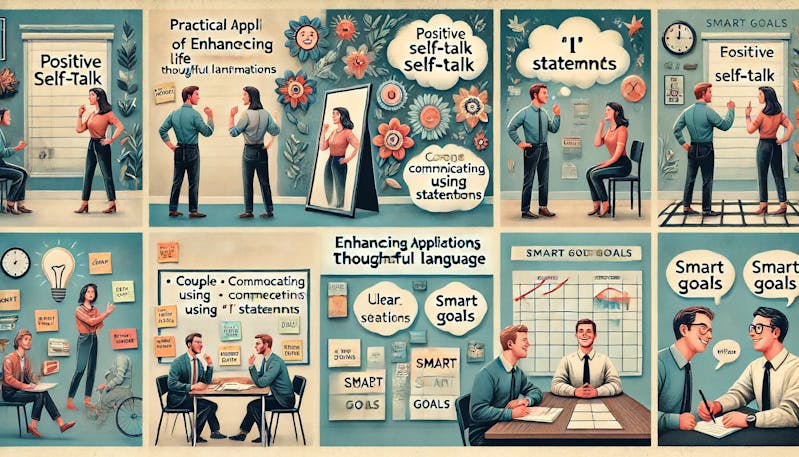The Power of Words:
Enhancing Your Life Through Thoughtful Language
Words are not mere symbols on a page; they have the power to shape our reality, influence our emotions, and alter our perceptions. One of the most compelling demonstrations of this is the seminal study by Elizabeth Loftus and John Palmer, which showed how the wording of questions can change people's memories of events. This blog post will explore the science behind this phenomenon and provide practical tips on using beneficial words to enhance your life.

The famous study by Elizabeth Loftus and John Palmer on the influence of language on memory, specifically in the context of eyewitness testimony. This study is a cornerstone in the field of cognitive psychology and demonstrates how the wording of a question can affect an individual's recollection of an event.
Here's a detailed overview:
The Car Accident Study
Study Design:
The study, conducted in 1974, involved showing participants footage of car accidents. After viewing the footage, participants were asked questions about what they had seen.
Key Experiment:
Participants were divided into different groups and asked to estimate the speed of the cars using different verbs. The critical question was:
"About how fast were the cars going when they (smashed / collided / bumped / hit / contacted) each other?"
Findings:
The verb used in the question significantly influenced the speed estimates provided by the participants. For instance, the word "smashed" led to higher speed estimates compared to words like "hit" or "contacted".
A week later, participants were asked whether they saw any broken glass in the footage (there was none). Those who had been asked using the word "smashed" were more likely to report seeing broken glass.
Implications
Memory Distortion:
The study showed that memory is not only a passive recording of events but can be influenced and distorted by the language used during questioning.
This phenomenon is known as the "misinformation effect".
Eyewitness Testimony:
These findings have profound implications for the legal system, particularly concerning the reliability of eyewitness testimony. Slight changes in how questions are framed can lead to significant differences in recall, potentially impacting the outcomes of legal proceedings.
Supporting Studies
Numerous studies have since explored and confirmed the findings of Loftus and Palmer. For example:
Loftus, E. F., & Zanni, G. (1975). "Eyewitness Testimony: The Influence of the Wording of a Question." Bulletin of the Psychonomic Society. This study further explored how subtle changes in question wording could alter eyewitness accounts.
Loftus, E. F. (1996). "Eyewitness Testimony." Harvard University Press. This book provides a comprehensive overview of research on the reliability of eyewitness testimony and the factors that can influence it.
Practical Applications: Enhancing Your Life Through Thoughtful Language
1. The Language of Self-Talk
One of the most direct ways words influence our lives is through self-talk, the internal dialogue we have with ourselves. Negative self-talk can sap our motivation and reinforce feelings of inadequacy. Conversely, positive self-talk can boost our confidence and resilience.
Tips for Positive Self-Talk:
- Reframe Negative Thoughts: Instead of saying, "I can't do this," try "I will give it my best shot."
- Affirmations: Use daily affirmations to reinforce positive beliefs about yourself. For example, "I am capable and strong."
- Gratitude: Regularly express gratitude for your abilities and achievements, no matter how small they may seem.
2. The Impact of Language in Relationships
The words we use in our relationships can either build bridges or create chasms. Thoughtful, positive communication can enhance mutual respect and understanding, while negative language can lead to conflicts and misunderstandings.
Tips for Positive Communication:
- Use “I” Statements: Express your feelings and needs without blaming others. For example, "I feel upset when..." instead of "You always make me upset."
- Active Listening: Show that you are listening by summarizing what the other person said before responding.
- Compliments and Appreciation: Regularly express genuine compliments and appreciation to strengthen your relationships.
3. The Role of Language in Professional Settings
In the workplace, the language we use can significantly impact our success and interactions with colleagues. Assertive and positive communication can enhance teamwork and productivity, while aggressive or passive language can create barriers.
Tips for Effective Professional Communication:
- Be Assertive: Communicate your needs and opinions clearly and respectfully. Avoid passive or aggressive tones.
- Positive Feedback: Offer constructive feedback that focuses on improvement rather than criticism.
- Clarify Expectations: Use clear and precise language to ensure mutual understanding of tasks and responsibilities.
4. Language and Goal Setting
The way we articulate our goals can influence our likelihood of achieving them. Specific and positive language in goal setting can create a clearer path to success.
Tips for Effective Goal Setting:
- SMART Goals: Ensure your goals are Specific, Measurable, Achievable, Relevant, and Time-bound.
- Positive Framing: Frame your goals positively. Instead of "I will stop procrastinating," try "I will work on tasks promptly."
- Visualization: Use vivid and positive language to visualize the achievement of your goals, which can enhance motivation and commitment.
5. The Influence of Language on Stress and Coping
How we talk about and interpret stressful events can influence our stress levels and coping mechanisms. Positive and constructive language can help us manage stress more effectively.
Tips for Managing Stress Through Language:
- Reframe Challenges: View challenges as opportunities for growth rather than insurmountable obstacles.
- Positive Mantras: Use positive mantras or phrases to calm your mind during stressful situations.
- Expressive Writing: Engage in expressive writing to process emotions and gain perspective on stressful events.
6. The Power of Persuasion: Influence and Negotiation
In contexts where persuasion and negotiation are key, such as sales or conflict resolution, the words we choose can significantly impact outcomes.
Tips for Persuasive Communication:
- Know Your Audience: Tailor your language to resonate with the values and needs of your audience.
- Use Storytelling: Incorporate stories to make your message more relatable and memorable.
- Ethos, Pathos, Logos: Utilize these rhetorical strategies to establish credibility (ethos), appeal to emotions (pathos), and present logical arguments (logos).
Conclusion
The words we choose to use every day have the power to shape our reality and influence our experiences. By understanding and harnessing the power of language, as demonstrated by the Loftus and Palmer study, we can enhance our lives in meaningful ways.
Whether it's through positive self-talk, effective communication in relationships and professional settings, strategic goal setting, managing stress, or persuasive communication, thoughtful language can be a powerful tool for personal growth and success.
Appendix: Further Reading and References
Loftus, E. F., & Palmer, J. C. (1974). Reconstruction of automobile destruction: An example of the interaction between language and memory. Journal of Verbal Learning and Verbal Behavior, 13(5), 585-589.
Loftus, E. F., & Zanni, G. (1975). Eyewitness Testimony: The Influence of the Wording of a Question. Bulletin of the Psychonomic Society.
Loftus, E. F. (1996). Eyewitness Testimony. Harvard University Press.
Brown, P., & Levinson, S. C. (1987). Politeness: Some Universals in Language Usage. Cambridge University Press.
Tannen, D. (1990). You Just Don’t Understand: Women and Men in Conversation. William Morrow and Company.
Here are some notable studies similar to the Loftus and Palmer study that demonstrate how words shape our reality by influencing memory, perception, and behavior:
Effects of Language on Visual Perception:
In a series of studies, researchers found that linguistic cues can significantly affect visual perception. For example, a study used continuous flash suppression to make objects invisible to participants. When the participants heard words that matched the invisible objects, they were more likely to report seeing them, suggesting that language can influence visual processing at an early stage (Frontiers) (Psychology Today).
Language and Color Perception:
Research on the Sapir-Whorf hypothesis, which posits that language shapes thought, has shown that speakers of different languages perceive colors differently.
For instance, Russian speakers, who have more words for shades of blue, are better at distinguishing between these shades than English speakers.
Impact of Positive Language on Self-Perception:
Studies have shown that positive self-talk can create a self-fulfilling prophecy, improving performance and mental well-being. Using supportive language in self-talk helps to silence the inner critic and foster a more optimistic outlook (Psychology Today).
Language and Stereotype Formation:
Research from Stanford University has demonstrated that the way we phrase sentences can unintentionally spread stereotypes. For example, framing one gender as the standard can perpetuate biases, highlighting the powerful role language plays in shaping social perceptions (Home Page).
Cross-Cultural Studies on Language and Perception:
Various studies have shown that cultural differences in language can influence how people perceive and interact with the world. For example, advertising language that includes polite forms and cultural references tends to be more effective in Japan, illustrating how language shapes consumer behavior and cultural norms (Home Page).
These studies collectively underscore the profound impact of language on our cognitive processes and social interactions. By being mindful of the words we use, we can positively influence our own perceptions and those of others around us.
For more detailed information, you can explore the following sources:
https://en.wikipedia.org/wiki/Misinformation_effect
https://www.calm.com/blog/reframing-negative-thoughts
https://www.betterup.com/blog/positive-affirmations
https://www.harpercollins.com/products/you-just-dont-understand-deborah-tannen
Want to Get Amazed Day by Day? ✨
Sign up now and start transforming your communication skills and perception of reality today!
Tell me your name and best email to receive these insights straight to your inbox.
“To Change the World, ,´Change the Word"” - Toni Vallenius
Your information is safe with our Privacy Policy.
Follow The White Rabbit...
I write practical tips to improve your communication and reveal reality altering experiments that might change the way you think forever!
Tell me your name and best email to receive these insights straight to your inbox. Sign up now and start transforming your communication skills and perception of reality today!
Your information is safe with our Privacy Policy.

Looking forward to connecting,
- Toni Vallenius
Looking forward to connecting,
- Toni Vallenius